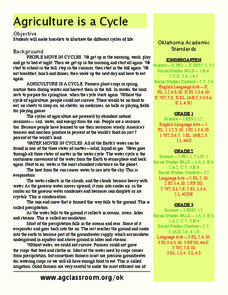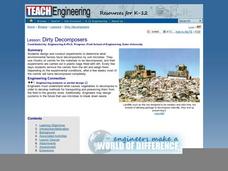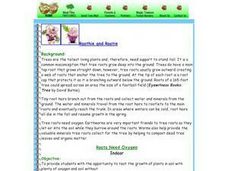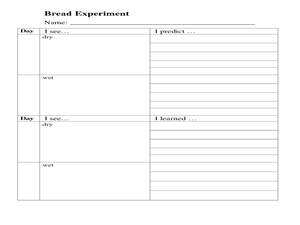Curated OER
Agriculture is a Cycle
Learners explore cycles in nature. In this cross curriculum agriculture lesson, students define "cycle" and research weather and planting folklore. Learners make a bracelet in which individual colored beads represent the many "cycles" of...
Curated OER
Organic and Inorganic Recycling
Young scholars examine their role in polluting the environment and discuss the importance of recycling. In groups, they place earthworms into compost piles to observe why they are considered natural recyclers. They also practice...
Curated OER
Characteristics of Living Things
Student use the scientific method to experiment with worms. In this characteristics of living things lesson, learners predict and examine the reactions of worms to dry and wet soil. Students share their findings.
Curated OER
Worms in a Bottle
Students gain a better understanding of the worm and its role in the recycling of organic materials into simpler forms by constructing worm bottles and observing for 60 to 90 days.
Curated OER
Science: Where the Worms Live
Students build mine-earthworm habitats to discover their niche in them. They make predictions about what the niche looks like in a week and draw a picture of it. Students notice the tunnels in the soil and how the sand and dirt are now...
Curated OER
Big Fat, Juicy Worms
Students collect and study information about worms. They discover how an earthworm helps process and loosen the soil. They write in their journals as well.
Curated OER
Dirty Decomposers
Seventh graders design and conduct experiments to determine what environmental factors favor decomposition by soil microbes. They use chunks of carrot for the materials to be decomposed, and their experiments are carried out in plastic...
Curated OER
Recyclers to the Rescue
Fifth graders examine the concept of the food chain and define producer, consumer, herbivore, carnivore, and omnivore. They draw a food chain for a mouse and discuss the different organisms involved in the chain, and conduct an...
Curated OER
Roots Need Oxygen
Students investigate the growth of plants in soil with oxygen and soil without oxygen. They discuss what roots need to survive, and chart the growth of two plants to analyze the difference between plain soil and soil with two earthworms.
Curated OER
Making a Mini Worm Habitat
Students explore the process of converting organic waste into usable fertilizer. They observe how living and nonliving things interact with one another by making a mini-worm habitat.
National Wildlife Federation
Habitat Web
Young scientists weave together an understanding of ecosystems with this fun collaborative activity. Taking on the roles of different living and non-living elements of specific habitats, learners use a ball of yarn to create the web of...
National Park Service
Reduce Our Carbon Footprint, Let’s Compost!
Roll up your sleeves and get a little dirty with this elementary and middle school compost lesson. All you need is a large plastic container, a couple old newspapers, some organic waste, and a few hundred worms and you're ready to start...
Desert Museum
Daisy Ecology
Here's a fine lesson plan that combines poetry with life sciences. Learners carefully listen to a poem that's all about a food chain. As the poem is read, learners name the producer, the herbivore, the carnivore, and the omnivore. Lots...
Curated OER
Nature's Perfect Recycler
What a great way to start a recycling lesson! Introduce your students to the dung beetle! They will get a kick out of "nature's perfect recycler," when they learn about the scarab beetle's way of life: eating dung and rotting...
Curated OER
The Human Impact on the Environment
Despite the typos and formatting issues, the Word document found here has some great potential. There are two questions that ask learners to put several events in a logical order; these could easily be made into a card sort activity....
Nuffield Foundation
Biodiversity in Your Backyard!
Take your enthusiastic ecologists outdoors to explore the biodiversity right in their own schoolyard! In preparing for this activity, it may be worthwhile to research websites with local flora to help in the plant identification portion.
Curated OER
Worm Compost & Vermicomposting
Students explore vermicomposting, the species of worms needed and the proper climate for it. In this composting lesson plan students make their own worm compost bin.
Curated OER
Case of the Missing Pumpkin
Students explore the process of decomposition in plants. In this plant biology lesson, students use a cleaned out pumpkin and observe how the decomposition process takes place. Students write down adjectives to describe the pumpkin.
Curated OER
Case of the Missing Pumpkin
Students explore the process of decomposition. In this science lesson, students carve a pumpkin and observe as it decomposes. Students compare the changes to an uncarved pumpkin. Students write about the disappearing pumpkin.
Curated OER
Dirty Decomposers
Learners explore the ecosystem by conducting a ziploc bag experiment. In this recycling lesson, students identify decomposer organisms in our environment and how they speed up the recycling process. Learners utilize a ziploc plastic bag,...
Curated OER
Composting
In this recognizing items that can be composted worksheet, students identify organic items that can be composted, write items that can be composted for each of the letters in the word compost, and make a list of vegetables and fruits....
Curated OER
Food Chains
Fourth graders study food chains, producers, consumers, and decomposers. They play a food chain game and create food chain mobiles or posters. They take a nature hike around the school and observe various parts of a food chain.
Curated OER
Forest Decomposition
Students explore decomposition. Students define and describe components of the decomposition process. Students make a composter in a terrarium. Students record observations and changes weekly, drawing conclusions about the results of...
Curated OER
Reptiles and Amphibians
Fourth graders explore biology by viewing animal videos in class. In this amphibian and reptile lesson, 4th graders identify the key differences between reptiles, amphibians and other animal classifications. Students view video clips in...

























